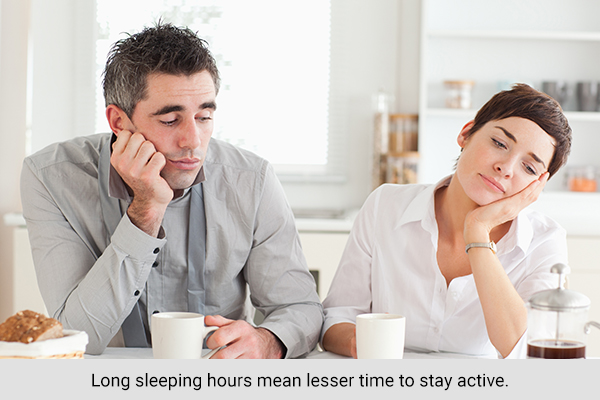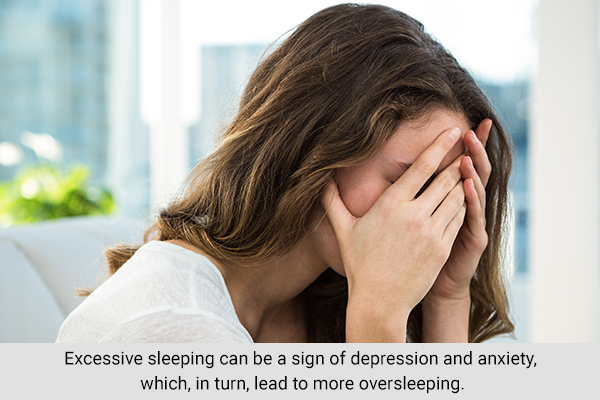In this article:
Good-quality sleep is essential for your physical as well as mental health, but too much of it can also have adverse consequences.

There has been a lot of discussion about the negative impact of sleep deprivation on health but not enough about oversleeping.
How Much Sleep Is Too Much?
The first thing to understand about this topic is: how much is too much sleep? Unfortunately, there is no straight answer to this.
The amount of sleep you need daily depends on various factors including age, physical fitness, genes, activity, stress, and overall health. Thus, some people may need more sleep than others such as kids, teenagers, people who are sick, or those who have been sleep deprived for many days.
As a general rule of thumb, experts suggest that 7–9 hours of nighttime sleep is sufficient for most healthy adults.
While it is completely normal to exceed this limit occasionally, sleeping for more than 9 hours a day on a regular basis can jeopardize your health in different ways.
Moreover, feeling drowsy and exhausted even after oversleeping for many days at a stretch could be a sign of a serious underlying issue that requires medical attention.
Bear in mind that the concept of oversleeping also covers lazing around in the bed (awake or trying to sleep) as well as the naps you take during the day.
Harmful Effects of Excessive Sleep
Here are some reasons to avoid oversleeping.
1. Chronic inflammation

Research has shown that too much sleep at night can make you feel low and tired throughout the next day. (1) This is because any major change in your normal sleep pattern can disrupt your body clock and deplete your energy levels.
If oversleeping becomes a common occurrence, it may trigger chronic, low-grade inflammation in the body that increases the risk of cardiovascular problems, type 2 diabetes, cancers, and other serious ailments. You’re also more likely to struggle with weight fluctuations.
There is considerable research linking poor or inadequate sleep with undue weight gain, but sleeping too much can increase your likelihood of becoming overweight or obese.
A study showed that people who got 9–10 hours of nightly sleep had a 21% higher risk of becoming obese over a span of 6 years than those who only got 7–8 hours of sleep, regardless of food intake and exercise. (2)
Long sleeping hours also mean lesser time to stay active. If you don’t move around enough during the day, you won’t be able to burn the extra calories that will keep piling on and eventually lead to weight gain.
2. Diabetes
Excessive sleep can spike blood sugar levels (3) as can sleep deprivation. If this becomes a habit, the sustained high blood glucose can pave the way for type 2 diabetes.
Thus, sleeping too much promotes a sedentary lifestyle, which makes you overweight. Excess body weight, in turn, makes you more susceptible to diabetes.
3. Early death
Large-scale population studies have found a link between too much sleep and premature death. The exact reason for this is not properly understood, but there are some probable explanations.
For starters, sleeping for long durations implies lesser time for physical activity during the day. Sedentary lifestyles tend to trigger inflammation in the body as well as increase the risk of diabetes and heart disease, all of which may contribute to early mortality.
4. Heart disease

Oversleeping regularly can make you more prone to heart disease, which is the leading cause of death in the United States according to the Centers for Disease Control and Prevention (CDC). (4)
This is a greater threat for women as they sleep more than men.
5. Pain
Pain can make it difficult for you to fall asleep and stay asleep. Such poor-quality slumber only prompts people to sleep for longer in an attempt to get a full quota of rest. This may seem like a good idea, but sleeping a lot will only exacerbate your condition further.
For instance, if you frequently get headaches, avoid oversleeping as it can worsen your pain by triggering certain neurotransmitters in the brain. (5) Similarly, if you suffer from chronic backaches, lying in your bed for too long can add to the stiffness and pain.
6. Impaired brain function
Your brain works round the clock to keep you functional and only gets to rest during sleep. Your brain not only repairs and rejuvenates itself during sleep, but also solidifies recent information and memories you have gained so that you can retain them for a long time.
If you don’t get enough sleep, your mind will become tired and go haywire. Unfortunately, many people don’t realize that oversleeping can also adversely impact your brain health.
Research has also shown that sleeping for more than 8 hours a day can make your brain age faster. The result is a gradual decline in cognitive ability, focus, reasoning skills, and overall brain function, which can make it difficult for you to perform the most basic daily tasks.
This is especially the case if you keep waking up during the night, which means you are unable to get proper restorative sleep that is needed to refresh your mind. (6)
7. Depression and poor mental health

Excessive sleeping can be a sign of depression and anxiety, which, in turn, lead to more oversleeping. You end up stuck in a vicious cycle that makes you grossly inactive in general and paves the way for other serious ailments.
According to a study published in Sleep Medicine Reviews, people who sleep too much are more likely to suffer from depression. (7)
Tips to Prevent Sleeping Too Much
Here are some easy ways to improve your sleep habits:
- Maintain a consistent sleep schedule: Retire to bed at the same time every night and wake up at the same time every morning. This will help regularize your body rhythm and minimize sleep loss or sleep debt.
- Prep yourself for sleep: Create a bedtime routine that helps you unwind because sleep will come more easily to you when your mind and body are relaxed. You can meditate, go for a bath, do a bit of yoga, listen to soothing music, or read a book to tune out the world at the end of a stressful day. At the same time, avoid stimulants such as coffee, LED screens, and heated conversations too close to bedtime as all this can delay sleep onset.
- Fix your sleep environment: Make sure your bedroom is warm and cozy during winter and cool and breezy during summer. Plus, it should be dark and quiet to promote better sleep. Install a humidifier if your sleeping space is too dry and arid.
- Stay active: Physical exertion during the day will tire your body out so that you fall asleep quickly at night. But don’t engage in vigorous exercise in the hours before bedtime as it can overstimulate you and drive away slumber.
- Avoid naps in the late afternoon: Snoozing at the wrong time can make it hard for you to fall asleep on time at night.
Most-Asked Questions
Can chamomile tea or lavender tea help me sleep?

Chamomile tea and lavender tea are promoted for their ability to reduce stress and anxiety. Chamomile, in particular, has a mild sedative effect and can help you fall asleep easily for a restful sleep.
A full night of restful sleep is key to avoiding oversleeping during the day or the next night. Just 1 cup of chamomile tea can be beneficial.
Can supplements help?
Some healthcare practitioners suggest the use of melatonin supplements, which is a sleep-inducing hormone naturally produced in the body. This also allows you to fall into a deep sleep, ensuring whatever sleep you do get is restful.
Consult your doctor before you start taking this supplement.
Final Word
Different people have different sleep needs, settings, and schedules. However, regularly clocking over 7–9 hours of shuteye is not healthy, more so if you don’t wake up refreshed even after sleeping so much and continue to fall asleep during the day. In such a case, a visit to the doctor is warranted.
- Was this article helpful?
- YES, THANKS!NOT REALLY


